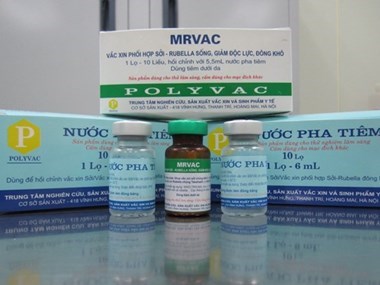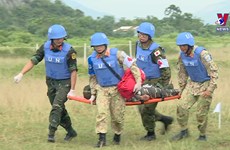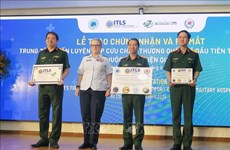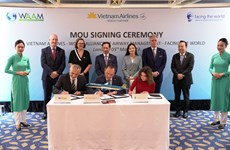Vietnam expected to produce mixed vaccines soon
 Illustrative image (Source: VNA)
Illustrative image (Source: VNA) Vietnam already manufactures 11 out of 12 vaccines used in the nationwide expanded free immunisation programme for children, including vaccines against tuberculosis, diphtheria, whooping cough, tetanus, measles, poliomyelitis, hepatitis B, Japanese meningitis B, cholera, typhoid and rubella.
In November 2016, Vietnam announced the successful production of a measles-rubella vaccine (MR) for the first time.
Vietnam is one of only 25 countries in the world that can produce vaccines and is the fourth in Asia to manufacture the MR vaccine, following Japan, India, and China, the Nhan Dan (People) weekly reported.
This is the first vaccine that has been produced in Vietnam by the health ministry’s Centre for Research and Production of Vaccines and Biology (POLYVAC) under a technology-transfer project launched by the Japan International Co-operation Agency (JICA).
In 2015, the WHO certified that Vietnam has a fully-equipped national regulatory authority (NRA) system that ensures the safety and efficacy of vaccines produced and used in Vietnam.
Deputy Health Minister Nguyen Thanh Long said the NRA achievement would open up opportunities for Vietnam to export vaccines and contribute in the fight against global epidemics.
In a recent NRA
assessment, the WHO said that four of Vietnam’s vaccines ─ Japanese B
encephalitis, measles, hepatitis A, and hepatitis B ─ can apply for WHO
pre-appraisal before being sold in bulk to international organisations.
Local vaccine
manufacturing facilities can currently supply enough doses for both domestic
needs and export demand.
In recent years, the Company for Vaccine and Biological Production No.1 (VABIOTECH) has exported over three million doses of Japanese B encephalitis vaccine to India. Japanese encephalitis vaccines are also penetrating the market of East Timor. In addition, 32,000 doses of hepatitis A vaccine have been exported to the Republic of Korea and 115,000 doses of oral cholera vaccine to Sri Lanka, the Philippines and India.
Vietnam currently has four factories producing vaccines, using equipment and technology that meets CGMP-WHO standards: VABIOTECH; Pasteur Da Lat Vaccine Company (DAVAC); POLYVAC; and the Institute of Vaccines and Medical Biologicals (IVAC).
However, challenges remain ahead for the vaccine production. Việt Nam is able to produce only single vaccines or certain types of material for mixed vaccines (multi-function vaccines that have from four to six vaccines in one dose).
In 2019, Việt Nam will no longer receive support from the Global Alliance for Vaccines and Immunization (GAVI) in regard to the five-in-one vaccine that protects people from diphtheria, tetanus, whooping cough, polio, and Hib disease.
The health sector is making efforts to produce five-in-one and six-in-one vaccines but is still encountering difficulties relating to technology and capital.
Deputy Minister Long said the research and production of five-in-one and six-in-one vaccines was among the top priorities of the country, and urged the supply of improved technology to produce such vaccines.-VNA













